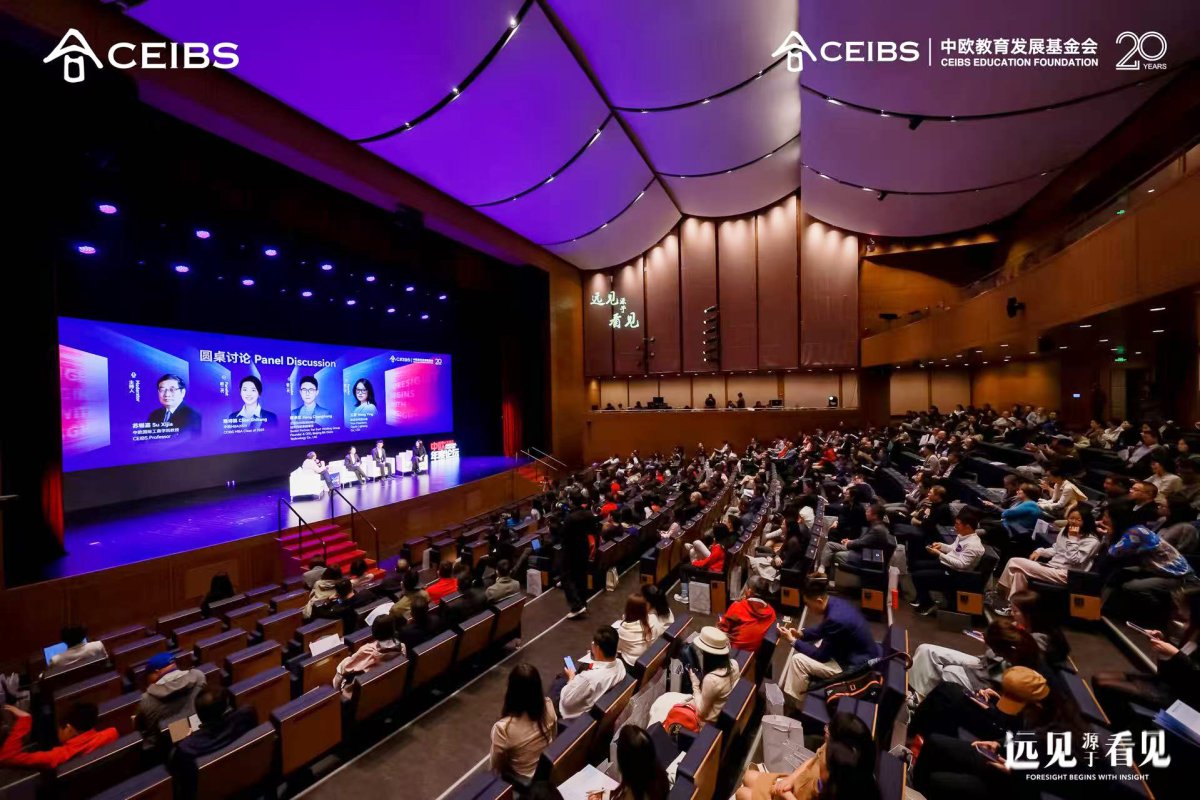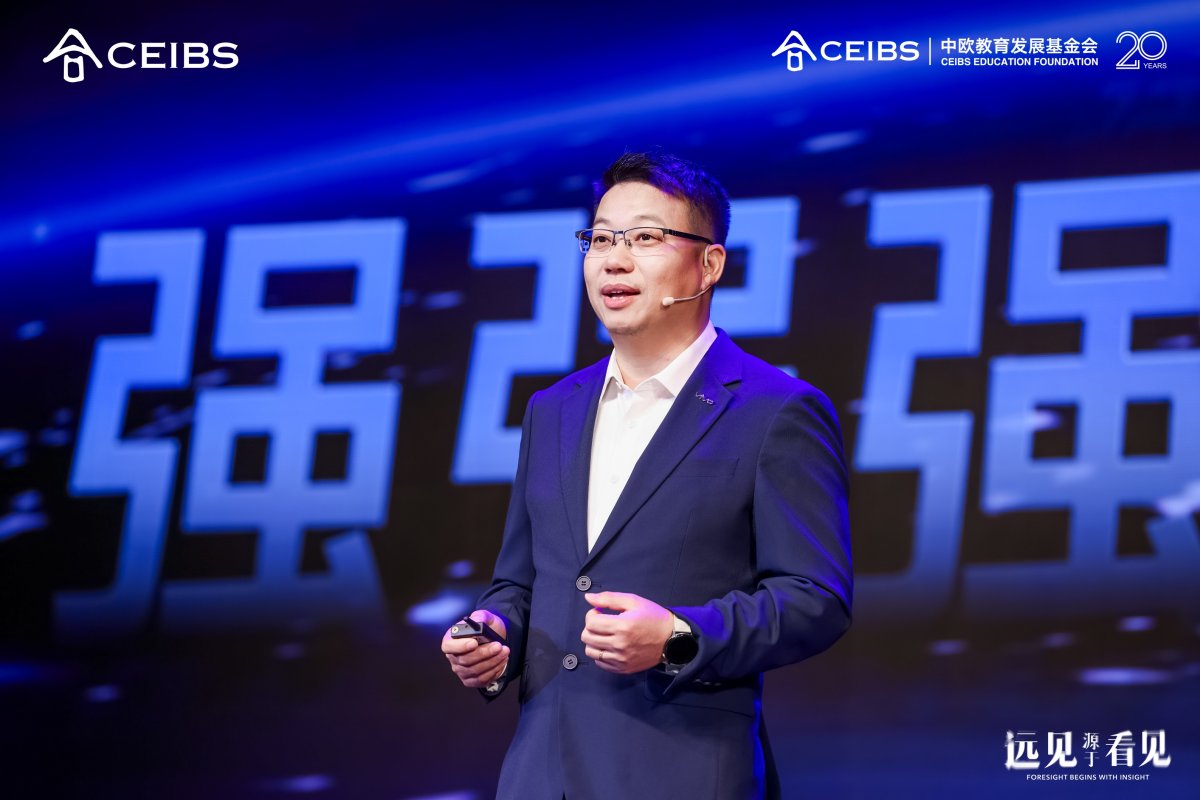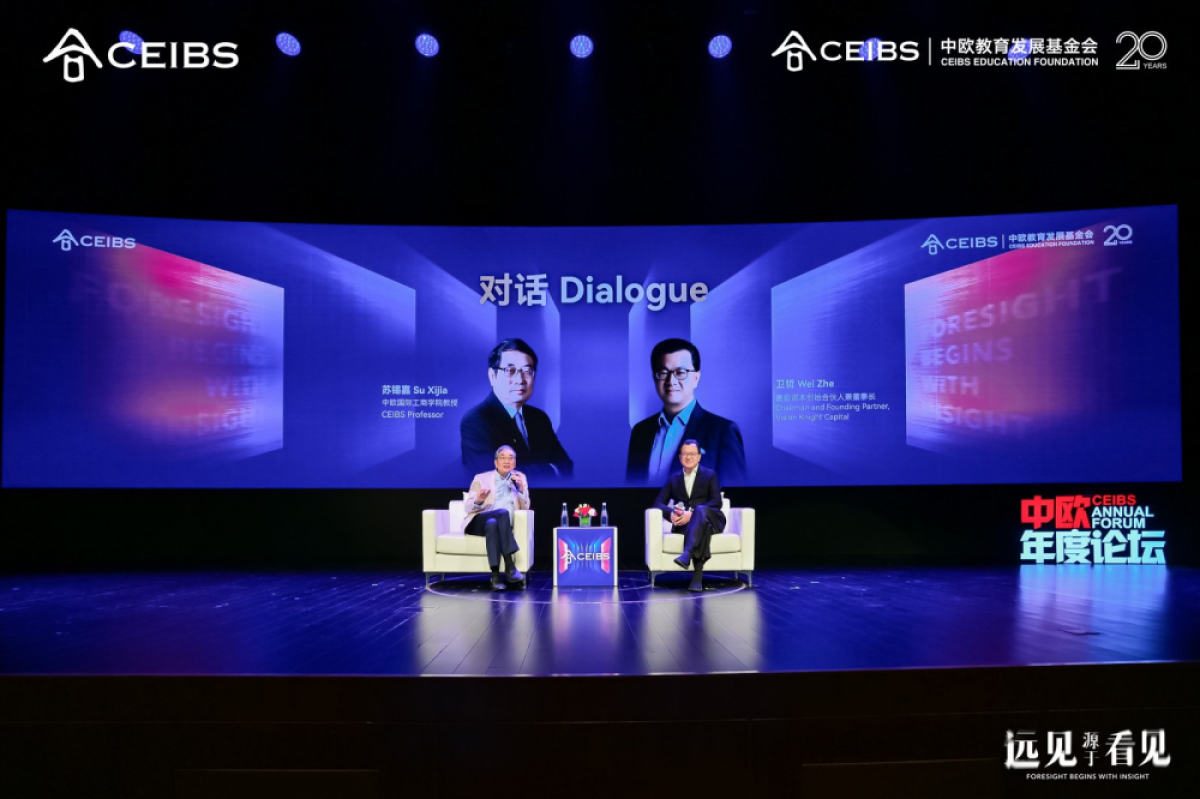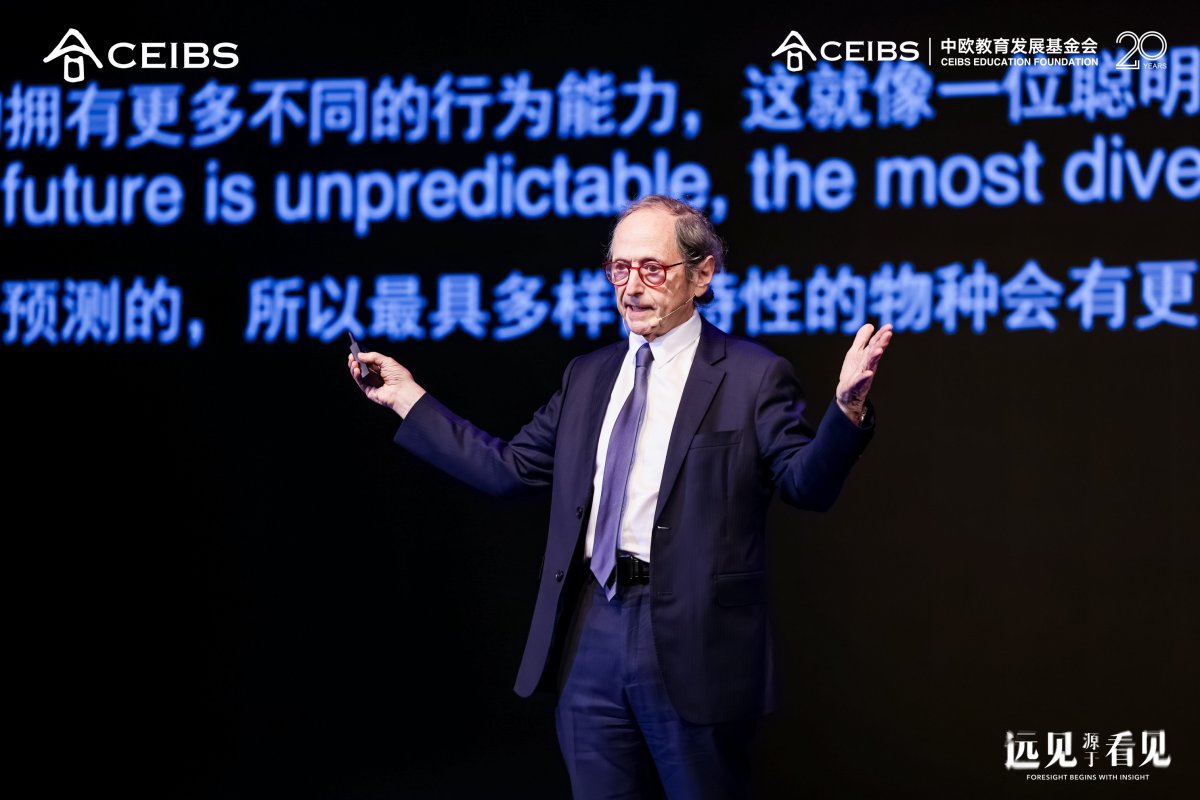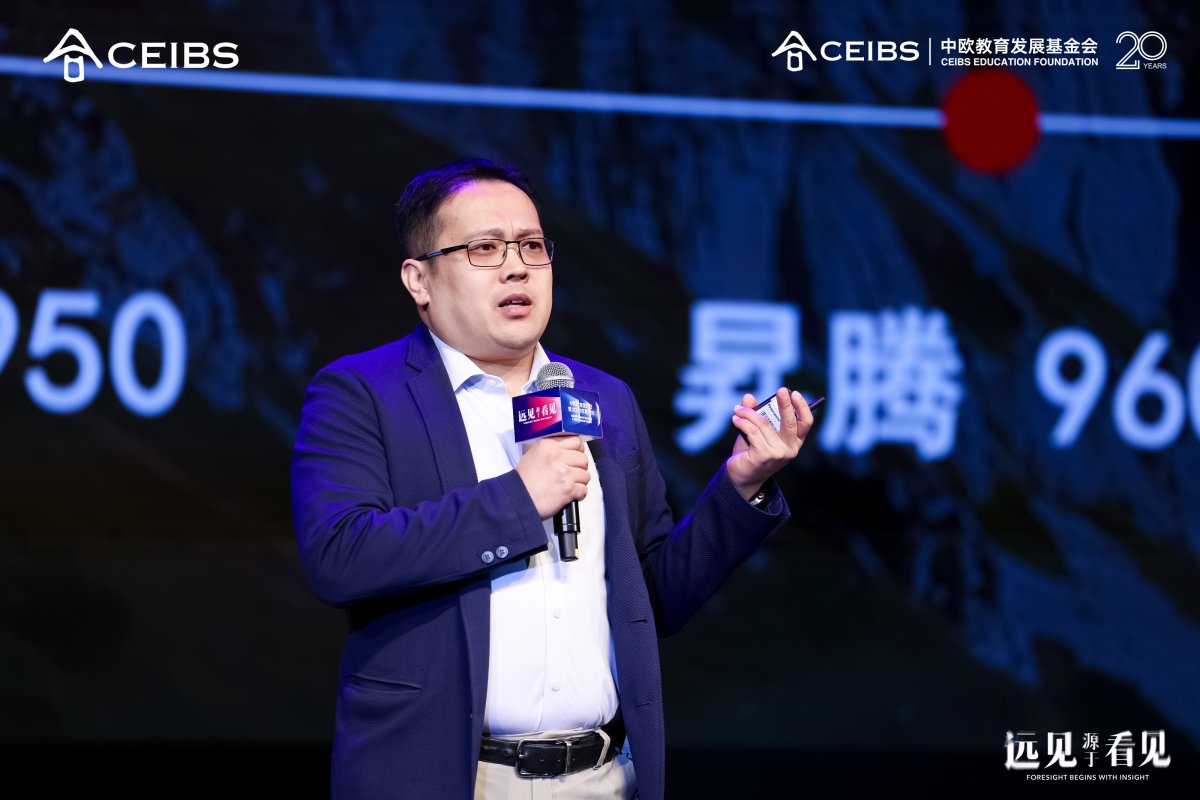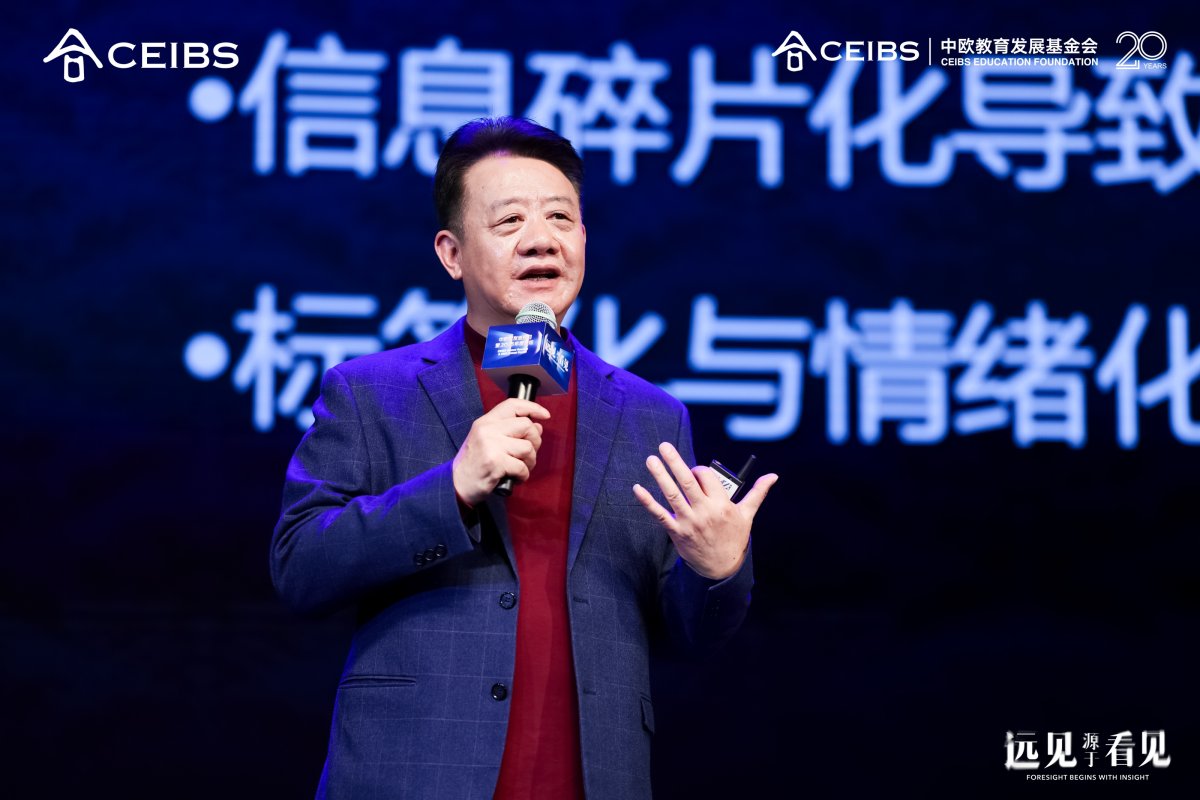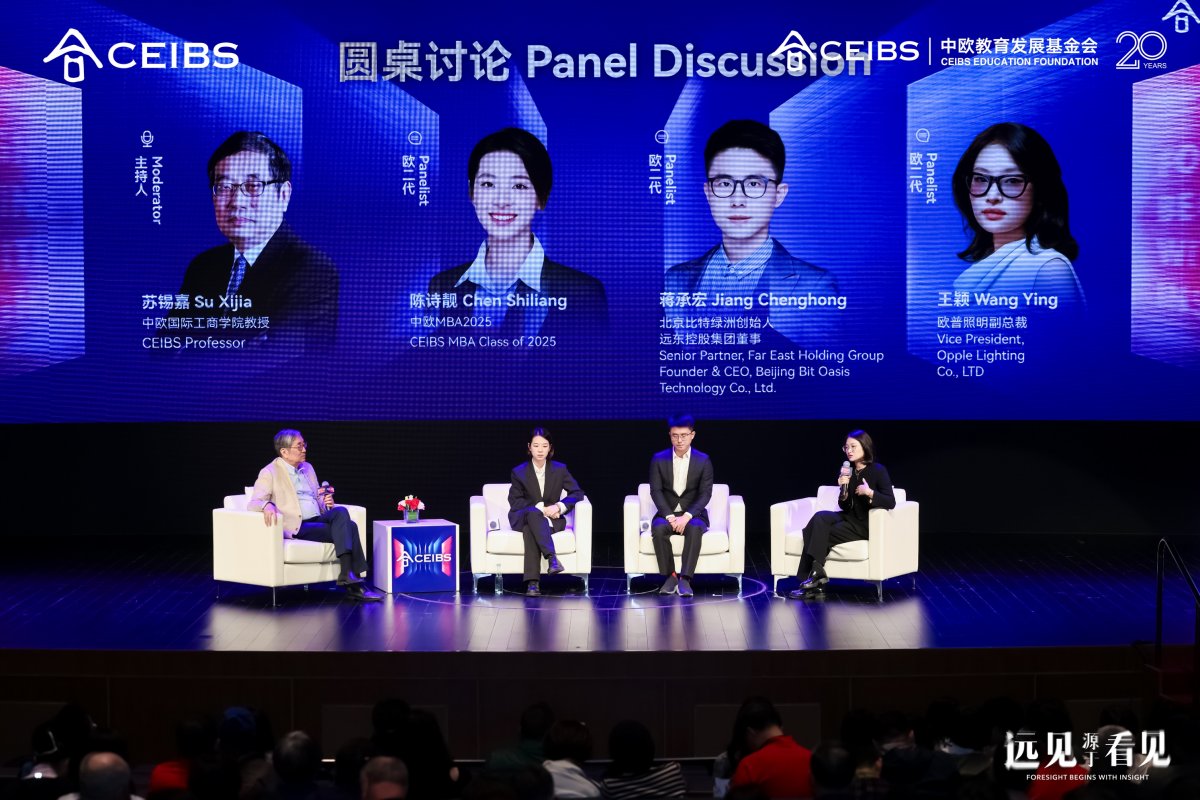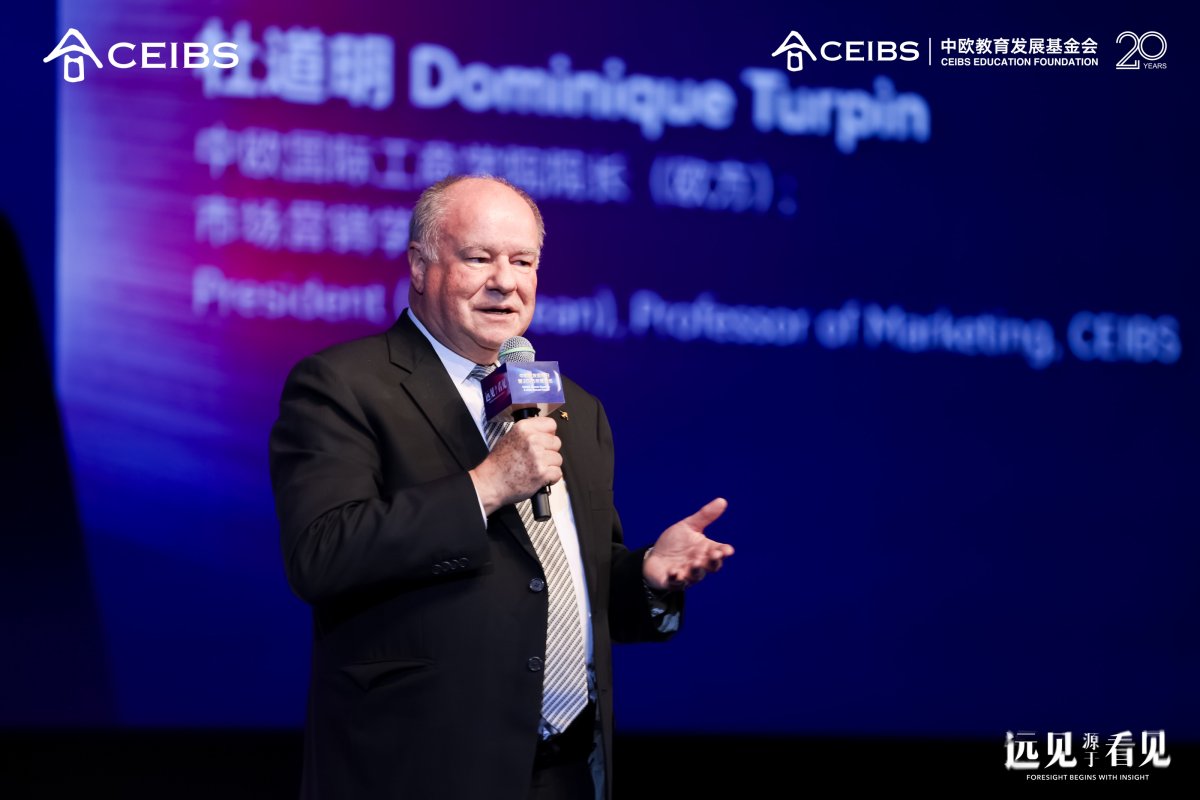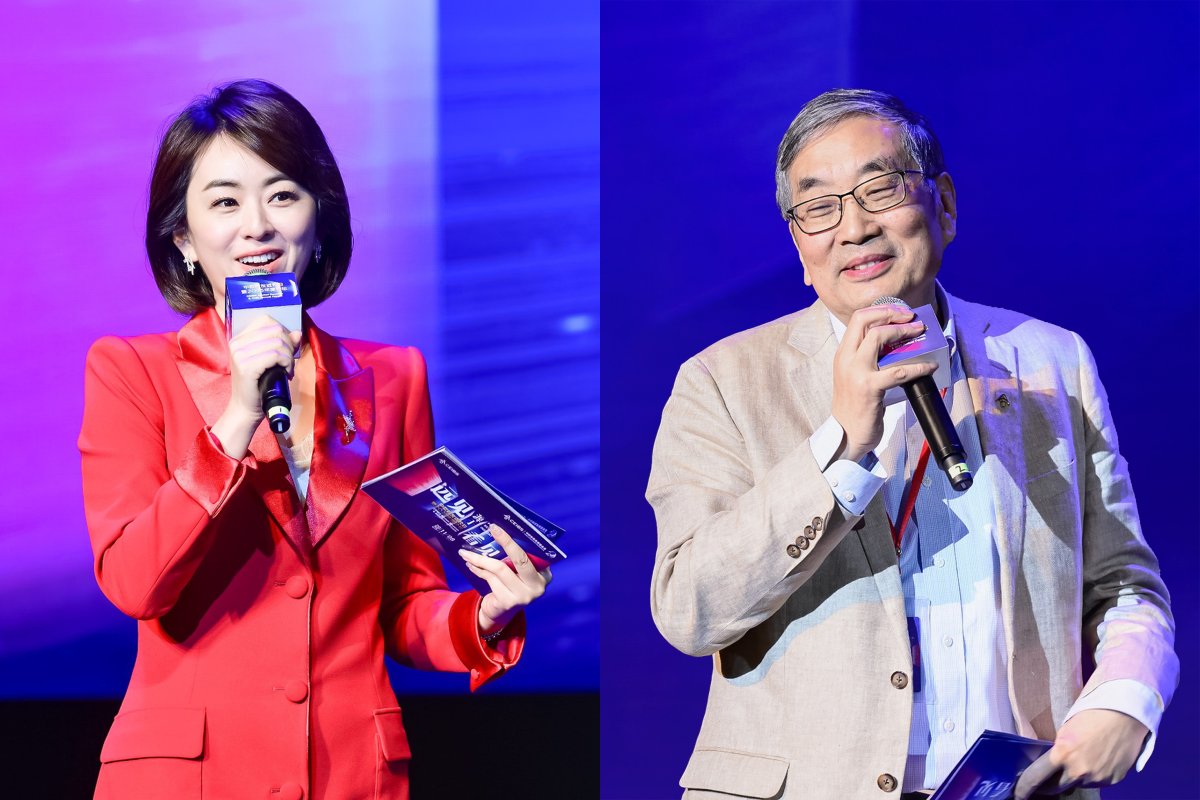CEIBS hosts Alumni Reunion & 2025 Annual Forum
November 8, 2025. Shanghai – The CEIBS Alumni Reunion & 2025 Annual Forum was held today on the school’s Shanghai campus, bringing together an exceptional line-up of company founders and CEOs, Nobel Laureates, academics, and cultural figures to explore topics ranging from AI and life sciences to culture under the theme “Foresight Begins with Insight.” The event was also streamed online, where it reached 1.2 million viewers.
The half-day forum featured two themed sessions: “Crossing the Cycle” and “Insight into the Future”. Each session included keynote speeches and thought-provoking dialogues on macroeconomic trends, strategic leadership, and technological disruption.
In her opening remarks, CEIBS President Wang Hong noted that the world is currently navigating a challenging “counter-cyclical” period marked by headwinds to globalisation, rising protectionism, escalating geopolitical tensions, and a continued slowdown in global economic growth. At the same time, emerging technologies such as artificial intelligence are driving industrial transformation at unprecedented speed, bringing both new opportunities and significant risks. Against this backdrop, she emphasised the idea that “foresight begins with insight,” meaning that true foresight stems from a deep understanding of reality and a clear-eyed awareness of future trends.
Reflecting on CEIBS’ own journey of growth, she pointed out that CEIBS is an instructive example of how to overcome cyclical challenges. Every step of its journey, she said, has been one of exploration and self-breakthrough, overcoming barriers and challenges along the way, ultimately earning its place among the world’s leading business schools. She called for resilience, confidence, and collective strength. “The ending of every cycle carries with it the seed of a new beginning. Even amid ups and downs, we must stay steady and remain confident in the face of uncertainty,” she said.
The first half of the forum, themed “Crossing the Cycle,” began with a keynote speech by Hu Baishan, Executive Vice President and Chief Operating Officer of vivo and President of the vivo Central Research Institute. He shared the core principles that he believes have enabled the company to navigate multiple economic cycles, arguing that the key lies not in chasing short-term trends but in staying true to a corporate culture grounded in integrity and responsibility.
True foresight, he explained, comes from three kinds of insight:
- “Seeing the user” — making customer needs the compass for all strategic and product decisions;
- “Seeing the essence” — fostering a win-win, altruistic mindset and building strategic partnerships throughout the value chain to create a healthy, co-prosperous ecosystem;
- “Seeing the future” — ensuring that expansion into new areas is led by core capabilities rather than driven by market hype.
He concluded that positive company culture is the ultimate defence against cyclical volatility, as it enables organisations to “sow the seeds with their heads down,” leveraging internal certainty to withstand external uncertainty and achieve sustainable, long-term growth.
Following this, Gu Bin — Head of Content & Asian Auctions at Kelleher Auctions, CEIBS EMBA 2014 alumnus, and President of the CEIBS Alumni New York Chapter — delivered a keynote speech in which he shared three real stories of CEIBS alumni navigating business challenges in the United States, ranging from legal hurdles to cultural clashes and cross-border management.
He pointed out that true globalisation goes beyond replicating existing business models abroad and ultimately requires deep self-evolution. It begins, he said, with respecting overseas legal frameworks and transforming compliance from a mere additional cost into a foundation for survival; it succeeds through mastery of cross-cultural management, where soft power becomes an even greater competitive advantage than hard technology; and ultimately, its strength and confidence derive from the “China Depth, Global Breadth” that embodies CEIBS’ mission — the ability to integrate mature systems, strong execution, and complex problem-solving skills honed in China with a profound understanding of the global landscape, enabling businesses to take root and thrive in new environments.
This was followed by a dialogue between CEIBS Professor Su Xijia and Wei Zhe, Chairman and Founding Partner of Vision Knight Capital, on the topic of companies going global and overseas investment. Mr. Wei highlighted that the essence of a great company lies in “one hard metric and three soft powers.” The hard metric, he explained, is efficiency, rather than the blind pursuit of scale or growth. The three soft powers are team continuity, strategic adaptability, and shared values, which together form the foundation of a company’s long-term strength.
In terms of strategy, Mr. Wei advocated targeting high-standard Western markets to drive product upgrades and proposed positioning the brand directly to the most valuable consumers. He then outlined four key choices for successful global expansion:
- Regions — aim for strategic high grounds;
- Categories — focus on niche overseas demands;
- Channels — build a pyramid-shaped, tiered distribution system;
- Brand — compete on value and quality, not on low price.
Looking ahead, he urged investors to favour companies that combine hardware strength with cultural and software-driven value. “Don’t worry about missing one train — China will continue to create the next wave of investment opportunities,” he concluded.
The second dialogue featured two leaders in China’s cultural industry: Yi Gongzi, Founder of Eyart, and Mao Shipian, Founder of CiNian Culture, both CEIBS alumnae, who explored female entrepreneurship and their views on the meaning of life.
Ms. Yi candidly reflected on her twelve-year entrepreneurial journey, describing it as one marked by constant struggle — a “practice against human nature” — with moments of doubt surfacing hundreds of times each year. Her turning point came when she shifted her focus from Western art to Chinese culture, a journey she called an awakening: “from outward exploration to inward discovery.”
Ms. Mao, meanwhile, advocated approaching entrepreneurship with a “spirit of play,” facing uncertainty with curiosity, joy, and a sense of exploration. Their dialogue concluded on a simple yet powerful note: “Live — and live well.”
The second half of the event, focusing on “Insight into the Future,” began with a forward-looking keynote by 2013 Nobel Laureate in Chemistry and Member of the American National Academy of Sciences Michael Levitt entitled “How Should Humanity Navigate the Era of Great Intelligence?” Drawing from his pioneering work in computational biology and decades of experience in science and technology, Prof. Levitt presented a framework of four distinct but interrelated forms of intelligence — Biological, Cultural, Artificial, and Personal — as a lens through which to understand life in the age of AI.
He first explained that Biological Intelligence (BI) originates from nature’s own learning process: evolution. In the natural world, he said, it is not the strongest but the most diverse — those that continuously adapt and innovate — that survive. Turning to Cultural Intelligence (CI), Prof. Levitt emphasised the human capacity for inspiration, mentorship, and the transmission of knowledge across generations. He also observed that the vast majority of groundbreaking discoveries are made by the young rather than the old, and that leaders in fields from science to business should therefore grant brilliant young minds independence early in their careers.
In an in-depth analysis of the models underlying Artificial Intelligence (AI) and its significance in the story of human development, Prof. Levitt encouraged participants to engage with AI as much as possible. “AI has the answers, but we need to ask the right questions,” he said, before urging the audience to “stay curious like an eight-year-old, and wise like an eighty-year-old,” maintaining a deep interest in the world alongside healthy scepticism, always verifying information before accepting it as fact. Finally, in discussing Personal Intelligence (PI), Prof. Levitt advocated developing personal physical well-being through four pillars — Nourish, Rest, Move, and Thrive — as the foundation for sustained creativity, resilience, and learning in the age of AI.
Liu Wei, Vice President of Huawei Ascend Computing, then took to the stage to review the evolution of Huawei’s AI computing business, asserting that “computing power is national power.”
He outlined two key phases in the company’s journey. Before 2018, Huawei expanded rapidly during the peak era of globalisation; however, the company pivoted toward independent innovation after facing external sanctions in 2018. This experience, he noted, made him realise that key technologies must always be kept within a company’s own hands.
Despite technological blockades, Huawei has successfully navigated challenges through global talent integration and sustained R&D investment, he said. He went on to share his experience personally recruiting mathematicians abroad, noting that top talent values challenging and engaging work. Today, Huawei develops everything in-house — from chips to software — and has open-sourced its core architecture to empower the industry. He highlighted real-world applications of Huawei’s Ascend AI platform in areas such as agricultural quality inspection and industrial testing, demonstrating the immense value of integrating AI with the real economy. In conclusion, he called on the technology industry to seize the “golden decade” of artificial intelligence through integrated software–hardware development.
Liu Qing, Zijiang Distinguished Professor at East China Normal University and an expert in political philosophy, followed with a keynote speech that delved into the relationship between technology and human civilisation, stressing that technology is never neutral, and can erode humanity’s essence as well as expanding human potential.
He asserted that the rapid pace of digital technology is currently outstripping our ability to adapt to it, leading to fragmentation in rational thinking, and dulling our sensory experiences as virtual worlds take precedence over our own. This has brought us to a crossroads, he said, representing a choice between “the twilight of humanity” and “the dawn of post-humanism,” as traditional humanist values are reshaped by technology.
He concluded with a passionate call for society to reflect on the fundamental question of what it means to be human in a world which is constantly being redefined by technology.
The event also featured with a panel discussion, moderated by Prof. Su Xijia, with panellists including current CEIBS MBA student Chen Shiliang, Senior Partner of Far East Holding Group and Founder and CEO of Beijing Bit Oasis Technology Jiang Chenghong, and Vice President of Opple Lighting Wang Ying.
The event then concluded with remarks from CEIBS President (European) Dominique Turpin, who thanked all attendees for their presence at the event. He highlighted the importance of learning not only through academic knowledge but also through the heart, emphasising optimism, humanity, and an open mind.
“Our heart is very important in the age of technology. Humanity, heart, and humility are key. We must recognise that we don’t know everything and remain open to the world, and this is exactly what we teach at CEIBS,” he concluded.
The event was hosted by CEIBS Professor Emeritus Su Xijia, and Sun Ruiqi, Producer and Host of YICAI and CEIBS alumna.







